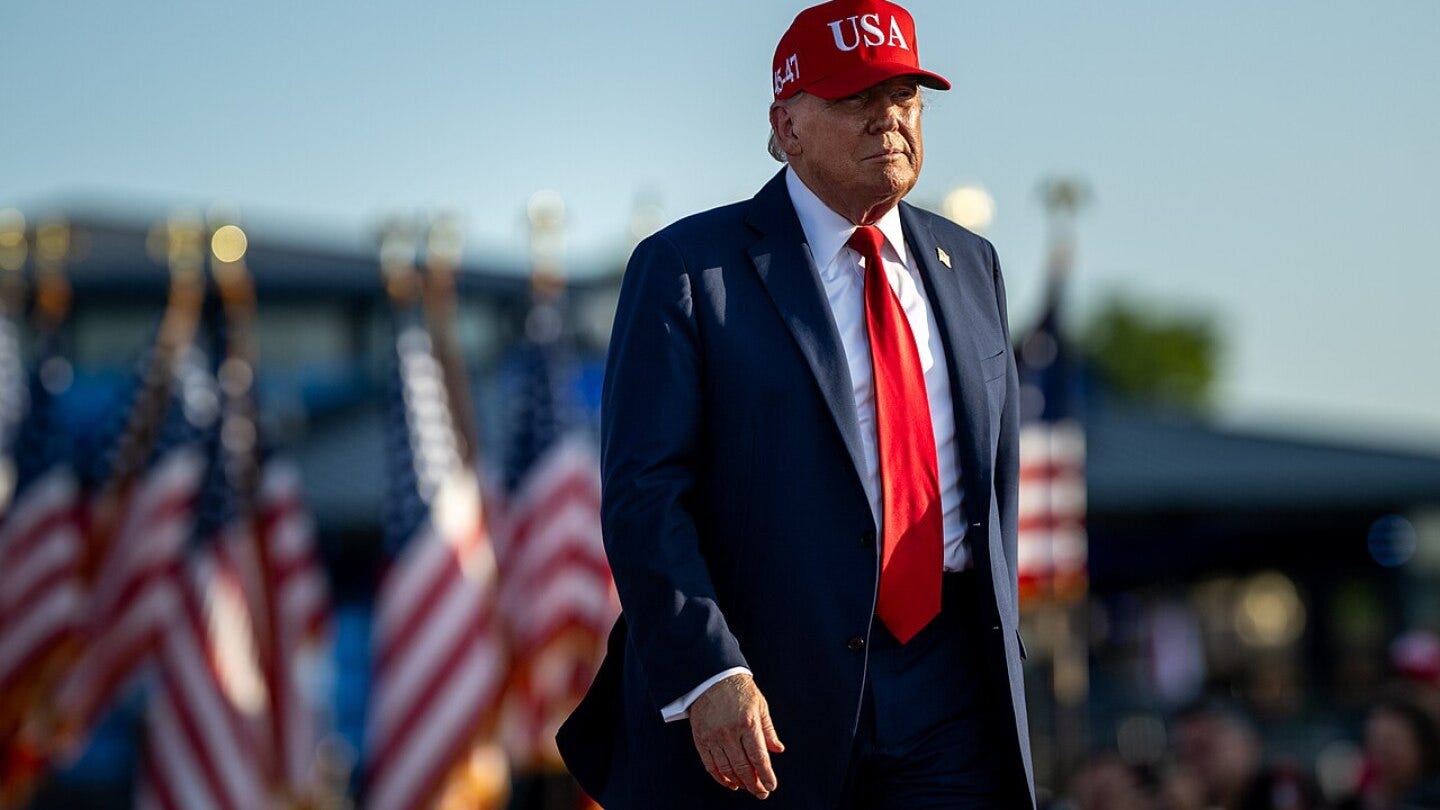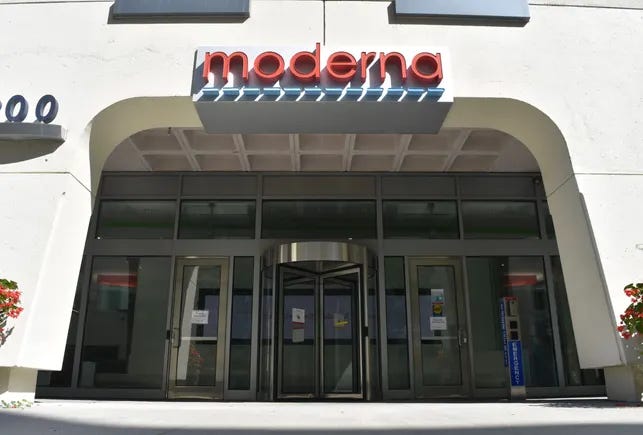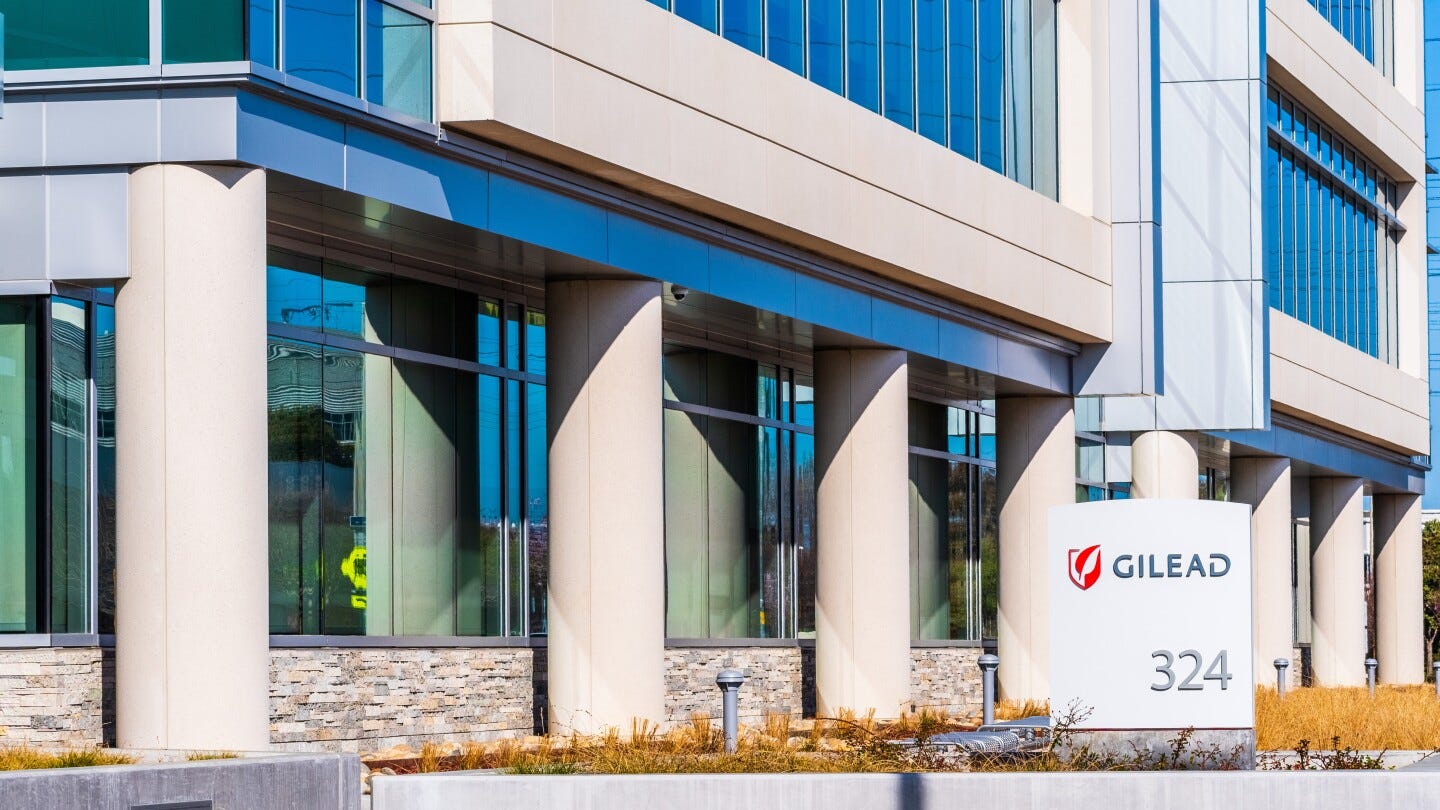Hello Avatar! Another week of biotech news is in the history books. We are proud to bring you the latest edition of our weekly biotech news fix. The content is designed to be consumed as a quick scroll to bring readers up to speed on key events from the week. For those of you interested to read a bit more, we provide links to the source articles.
We are now publishing 7x per week according to the following cadence:
Mondays: Stocks
Tuesdays: Biotech
Wednesdays: Podcast
Thursdays: Markets
Fridays: News
Saturdays: Podcast
Sundays: Strategy
We are also publishing unique content on X - be sure to follow up if you are not already @BowTiedBiotech. And to check-out the archive of our work on X you can find it on our website at: BowtiedBiotech.subtack.com/x-articles.
SUBSCRIBE TO PODCAST HERE:
Please help spread the work by subscribing and hitting the share button if you are enjoying content!
BIOTECH NEWS UPDATES FOR THE WEEK 7/7/25
Trump Threatens 200% Pharma Tariffs—But Gives At Least 1-Year Grace Period
President Donald Trump has announced that imported pharmaceutical products may soon be subjected to a tariff of 200%, according to reports from multiple news outlets. Addressing the media during a cabinet meeting, Trump also stated that the pharmaceutical industry will be granted a grace period to adapt their supply chains accordingly. Furthermore, he said: "We’re going to give people about a year, a year and a half, to come in,” before adding that after this time, if they have to import pharmaceuticals into the country, the drugs “are going to be tariffed at a very, very high rate, like 200%."
It's worth noting this measure has not been implemented immediately and there is uncertainty surrounding whether the administration will follow through with these plans in the future, according to Leerink Partners. In fact, these analysts view President Trump's announcement as a positive for the biopharma industry. Trump has been discussing potential pharma tariffs for several months now, with the subject coming up just a few weeks into his second term. A key component of his discussions is his demands for industry leaders to onshore their manufacturing or face tariffs on their products.
Moderna COVID vaccine gets full approval for children
On July 10, 2025, the Food and Drug Administration (FDA) granted full approval for Moderna’s COVID-19 vaccine, Spikevax, for children aged 6 months through 11 years old who are at an increased risk for COVID-19. The vaccine was previously available to this age group under emergency use authorization. Moderna expects to have an updated version of its shot available in time for the 2025-2026 respiratory disease season. This approval occurs amid regulatory changes under Health and Human Services Secretary Robert F. Kennedy Jr., who announced that COVID vaccines would no longer be recommended for healthy children and pregnant people; currently the Centers for Disease Control and Prevention recommends shared clinical decision-making for healthy children.
Under Kennedy’s leadership as HHS head, there has been increased scrutiny of COVID vaccines, with mRNA vaccines receiving particular attention. Kennedy has caused upset by firing all 17 members of an advisory panel to the CDC and replacing them with his own selected advisers. This has led to questionings of evidence supporting the efficacy and safety of the vaccines. Kennedy and the FDA have rolled out tighter vaccine regulations that mandate drugmakers gather additional data to secure approval for booster shots in healthy adults and children, which may hinder future development. This week, Kennedy faced a lawsuit from six medical associations and one pregnant doctor for his actions, demonstrating the intense debate surrounding vaccine policy.
FDA Publishes Cache of Complete Response Letters in Bid for ‘Radical Transparency’
The U.S. Food and Drug Administration (FDA) has released over 200 Complete Response Letters (CRLs) from its archives as part of an effort to "embrace radical transparency," it announced recently. These CRLs were issued in response to rejected applications for new drug or biological product approvals. The letters, which are now publicly available on openFDA, were sent to both large pharmaceutical companies, such as Eli Lilly and Regeneron, and smaller biotech firms for a plethora of different medical indications. Applications covered in the letters span from 2020 to 2024, according to the FDA, although some applications were found to date back to 2009.
The goal of this move, per the FDA's announcement, is to enhance public understanding of its decision-making process. The regulator also believes this step will give drug developers and investors a better idea of what to expect from the FDA, making drug development more predictable and accelerating the approval of effective treatments and potential cures. The FDA noted that a 2015 analysis revealed that 85% of companies did not disclose safety and efficacy concerns raised by the FDA when their applications were rejected. The agency also suggested that by making these CRLs public, it may help prevent repeated mistakes in the industry. The published CRLs, referred to as an "initial batch" by the FDA, all concern medications that have since been approved.
Merck Makes Big Respiratory Play With $10B Acquisition of Verona
Pharmaceutical giant Merck has undertaken a significant expansion into the respiratory sector with its acquisition of Verona Pharma in a $10 billion deal. This move allows Merck to acquire the commercial chronic obstructive pulmonary disease (COPD) drug Ohtuvayre, which could help offset potential losses when the patent for Keytruda, one of Merck's top-selling drugs, expires later in the decade. As one of the largest mergers and acquisitions of the year, Merck will pay $107 for each Verona American Depository Share, summing up the total transaction value to approximately $10 billion. This agreement has been unanimously approved by both companies' boards and is expected to finalize in the last quarter of the year following antitrust and regulatory clearances and other standard conditions.
The acquisition of Verona will enable Merck to enhance its respiratory portfolio with FDA-approved Ohtuvayre. The COPD treatment is estimated to bring about $400 million in sales in 2025, with peak sales forecast reaching about $3.4 billion. In the first quarter, Verona filled approximately 25,000 prescriptions for the drug, resulting in $71.3 million in sales. The recently FDA-approved respiratory syncytial virus antibody Enflonsia, recommended for children under eight months old who weren't protected by maternal antibodies, is another feather in Merck's respiratory cap. The acquirement is a significant part of Merck's strategy to persistently evolve its respiratory portfolio in preparation for the anticipated loss of Keytruda's key patent protection.
AbbVie Scoops Up Ichnos Glenmark’s Lead Myeloma Antibody for Nearly $2B
AbbVie, the pharmaceutical company, has acquired Ichnos Glenmark Innovation’s lead myeloma antibody, ISB 2001, for nearly $2 billion. The deal includes a $700 million upfront payment and gives AbbVie access to the clinical-stage, first-in-class trispecific antibody currently being tested for certain types of multiple myeloma as well as autoimmune indications. AbbVie has entered a licensing agreement with the New York-based biotech Ichnos Glenmark Innovation, which grants them the rights to an investigational first-in-class trispecific antibody for oncology and autoimmune diseases.
The agreement has AbbVie paying IGI $700 million upfront, with potential for up to $1.225 billion in addition to milestone payments and tiered, double-digit royalties. AbbVie will receive development, regulatory and commercial rights for ISB 2001 in North America, Europe, Japan and Greater China. The antibody was awarded orphan drug designation for multiple myeloma in July 2023 and Fast Track designation this past May for specific patient groups with relapsed/refractory multiple myeloma. This deal follows AbbVie’s acquisition of Capstan Therapeutics and its CAR T therapies suite for $2.1 billion.
Gilead to Provide New HIV Drug to Lower-Income Countries Through Novel Philanthropic Partnership
The international nonprofit, the Global Fund to Fight AIDS, Tuberculosis and Malaria, is partnering with Gilead and other private companies to provide the newly FDA-approved HIV preventive Yeztugo to low-and middle-income countries simultaneously with high-income countries. This is the first time in history that a preventative HIV drug will be made accessible to these countries at the same time as wealthier countries. The countries benefiting from the program will be selected based on the prevalence of HIV, existing prevention programs, and the availability of resources. Some countries, particularly those in the sub-Saharan region and those with high HIV infection rates, have already shown strong interest in the program.
The cost of the rollout has not been made clear, but it's understood that the Global Fund is relying on private-sector financers and the philanthropic organization, the Children's Investment Fund Foundation, to afford the introduction and distribution of Yeztugo. The drug itself has shown significant promise in its efficacy to prevent HIV infection, in Phase III studies showing a 96% to 100% prevention efficacy in different patient populations. Moreover, Yeztugo has been touted as a momentous step in improving HIV prevention options, particularly for vulnerable groups.
Lilly Gets FDA Label Update for Alzheimer’s Drug To Mitigate Safety Concerns
The FDA has allowed a new dosing schedule for Eli Lilly’s Alzheimer’s drug, Kisunla, to mitigate safety concerns. The update was made to lessen a problematic side effect related to fatalities in the monoclonal antibody drug class. The revised dosing scheme has the potential to give Eli Lilly’s Kisunla a competitive edge over rival drugs Biogen and Eisai's Leqembi. The previously approved schedule for the administration of Kisunla was a 700-mg intravenous infusion for the initial three months, followed by 1,400-mg doses on a monthly continuation until the brain plaques are removed. The label revamp intends to resolve safety issues that have troubled the drug class ever since Eisai and Biogen’s Leqembi was granted approval.
During the time of Kisunla's market entry, the FDA raised suspicions about an imbalance of deaths in patients who took Kisunla compared to a placebo. The concerning adverse event is termed as amyloid-related imaging abnormalities (ARIA) and can appear on brain scans as swelling (ARIA-E) or brain bleeding (ARIA-H). Both Kisunla and Leqembi now carry a boxed warning for ARIA-E. To resolve these concerns, Lilly pursued testing new dosing strategies after approval. Results from the TRAILBLAZER-ALZ 6 study conducted in October 2024 revealed that adjusting initial treatment doses to 350 mg, followed by 700 mg, and then 1,050 mg, reduced the incidence of ARIA-E by 41% at week 24, and by 35% at 52 weeks. The treatment efficacy remained consistent with previous expectations.
The 5 Largest Biopharma Layoffs of H1 2025
The biopharmaceutical industry witnessed a significant increase in layoffs in 2025, with 130 companies cutting a total of 13,470 employees in the first half of the year. This represents a 31% year-over-year increase, according to data compiled from company press releases, WARN Act notices, SEC filings, and other resources by BioSpace. The largest layoffs, based on the number of people impacted, were noticed at Bayer, Bristol Myers Squibb (BMS), and Teva Pharmaceuticals. It should be noted that these figures exclude contract development and manufacturing organizations, contract research organizations, medical device firms, and services businesses.
Taking the title of the most extensive layoffs, Israel-based Teva Pharmaceuticals reportedly let go of nearly 2,893 employees across the globe. The roughly 8% workforce reduction, announced in May 2025, is anticipated to be completed by 2027. The decision is part of a strategic growth initiative and is estimated to generate around $700 million in net savings by 2027. Despite Teva achieving a year-over-year increase in revenue of 5% reaching $3.9 billion in Q1, the company revised its expected revenue for 2025 to $16.8 billion to $17.2 billion, a slight decrease from previous estimates.
Six Startups Changing The Way We Age
Six biotech startups are leveraging the latest biological insight and cutting-edge computational techniques to explore therapies that could enhance the quality of aging, a largely overlooked in the biotech domain. Plentiful funding is being channeled into the emerging longevity sector, approximating $4.8 billion since 2021, with a majority being received by a single biotech - Altos Labs. This article reviews Altos Labs and other promising longevity-focused biotechs, which are making strides in extending human lifespan, backed by robust investor support and impressive advances in the clinical phase.
Altos Labs, arguably the most recognizable player in the longevity domain, is aiming to revive cells to their resistant states, thus shielding them against external stressors - an ability that tends to wear down with aging. Their research revolves around pioneering work by Shinya Yamanaka from Kyoto University, and Juan Carlos Izpisua Belmonte's subsequent discovery that stem cells can be partially reverted, recouping resilience while also maintaining their identity. Altos translates these findings to understand the unique language of cell health, organ health, and the intricacies of their relationship. While Altos' innovative take presents an intriguing approach, it still has numerous aspects to consolidate and verify, as much of the biotech's science is based on preclinical findings.
CONCLUSION
There you have it, another week of your Weekly Biotech News Fix. We hope you enjoyed it, please drop a comment with any feedback you may have.
We are now publishing 7x per week according to the following cadence:
Mondays: Stocks
Tuesdays: Biotech
Wednesdays: Podcast
Thursdays: Markets
Fridays: News
Saturdays: Podcast
Sundays: Strategy
SUBSCRIBE TO PODCAST HERE:
Sundays and Mondays are under the paid umbrella, everything else is FREE. It is $5/month and we encourage you to support our efforts. It is less than 1 cup coffee these days and keeps us motivated to keep producing the hybrid science and business biotech focused content you will not find anywhere else all in the same place.
As a reminder, if looking to go deeper into the topics we cover check out our website BowTiedBiotech.com, or DM us on twitter, or email us: bowtiedbiotech@gmail.com
ABOUT BOWTIEDBIOTECH
As a reminder, the purpose of the BowTiedBiotech substack is two-fold. Primarily, we aim to provide our scientist audience the tools to build a biotech company and ultimately translate their ideas into medicines for patients. Secondarily, biotech investors may find this substack useful as we will be providing weekly market updates of the public AND private markets as well as heavily leveraging current financing events as teaching examples.
DISCLAIMER
None of this is to be deemed legal or financial advice of any kind. All updates are sourced from publicly available disclosures. Insights are *opinions* written by an anonymous cartoon/scientist/investor.
TOP BOWTIEDBIOTECH NEWSLETTERS












